
Breastfeeding is a magical journey of bonding between mother and child, but it’s not without its challenges. One of the most common concerns among nursing mothers is the adequacy of their milk supply. Are you producing enough? Is your baby getting the nutrition they need? If you’ve ever pondered these questions, you’re not alone. Let’s delve into tips for boosting your milk supply, understanding the influence of diet and hydration, and recognizing signs of low milk production.
Indian Galactagogues : Dietary Considerations
a. Foods that May Boost Supply
In India, the tradition of postpartum care is deeply ingrained in cultural practices. Many Indian foods and herbs are recommended to new mothers, both for recovery and to boost milk supply. Here’s a list of some Indian foods and herbs commonly believed to enhance lactation:
1. Fenugreek (Methi):
Fenugreek seeds are often used in Indian cooking and are believed to enhance milk production. They can be used in curries, parathas (flatbreads), or even consumed as tea.
Methi laddoos, a kind of sweetened ball made with fenugreek seeds, ghee, and jaggery, are commonly given to nursing mothers.
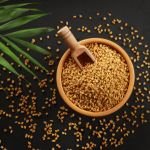
2. Fennel Seeds (Saunf):
Fennel seeds are considered good for digestion and are believed to boost milk supply. They can be chewed directly, used in cooking, or brewed as tea.
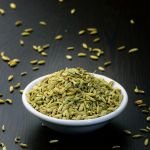
3. Garden Cress Seeds (Halim/Aliv):
These seeds are rich in iron and folic acid. They are commonly used to make ‘Aliv laddoos’ – a sweet dish believed to boost milk supply.

4. Carom Seeds (Ajwain):
Known for their digestive properties, carom seeds are also believed to enhance milk supply. They can be consumed with water or used in cooking.
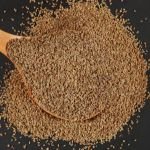
5. Dill Seeds (Suva):
Dill seeds are often recommended to new mothers as they are believed to increase milk production. They can be used in vegetable dishes or lentil preparations.
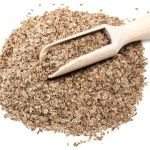
6. Edible Gum (Gond):
Edible gum is used in making ‘Gond ke laddoo’, a popular postpartum food. These laddoos, made with whole wheat flour, ghee, and nuts, are believed to be nutritious and help in increasing milk supply.
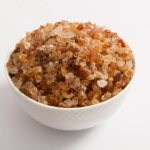
7. Garlic:
A common ingredient in Indian cuisine, garlic is believed to be a natural galactagogue. It’s often included in foods to enhance milk production.
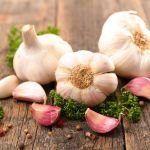
8. Moringa (Drumstick) Leaves:
Commonly used in South Indian dishes like ‘sambar’, these leaves are not only nutritious but also believed to boost milk supply.

9. Shatavari:
An adaptogenic herb used in Ayurveda, Shatavari is considered one of the best herbs for women. It’s believed to balance hormones and boost milk supply. It can be taken as a powder with milk.

10. Poppy Seeds (Khus Khus):
Poppy seeds are believed to be cooling for the body and are often recommended for lactating mothers. They can be used in sweets or other dishes.
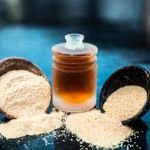
11. Bajra (Pearl Millet):
Bajra is a nutritious grain often recommended for nursing mothers. Bajra rotis (flatbread) or porridge can be consumed.
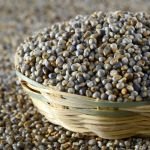
12. Ragi (Finger Millet):
Ragi is a rich source of calcium and iron. Ragi porridge or rotis are commonly given to lactating mothers to boost their overall health and potentially their milk supply.
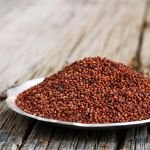
13. Jeera (Cumin):
Cumin seeds are believed to stimulate milk production and also aid in digestion. They can be added to curries, rice dishes, or even consumed with milk.
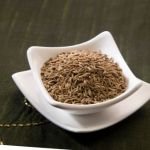
14. Sesame Seeds (Til):
Rich in calcium, sesame seeds are thought to be beneficial for nursing mothers. ‘Til laddoos’, made from sesame seeds and jaggery, are a popular snack.
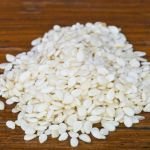
15. Rice:
Consuming rice, especially the red or brown variety, is believed to increase milk supply. A simple rice porridge or ‘kanji’ is often recommended to lactating women.
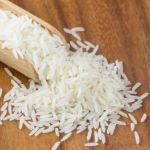
16. Pulses and Lentils:
Lentils like masoor dal (red lentils) and moong dal (split green gram) are believed to promote milk production. They are easy to digest and can be made into simple soupy preparations.
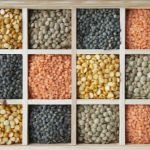
17. Sabja Seeds (Sweet Basil Seeds):
These seeds, when soaked in water, swell up and can be added to milk or consumed as a cool drink. They are believed to have a cooling effect on the body and support lactation.
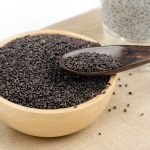
18. Turmeric:
This golden spice, known for its anti-inflammatory properties, is also believed to boost milk supply when consumed in moderation. ‘Turmeric milk’ or ‘haldi doodh’ is a common preparation.

19. Almonds:
Almonds, rich in Vitamin E and Omega-3 fatty acids, are believed to enhance milk production. They can be consumed raw, soaked, or added to various dishes.

20. Cowpea (Lobia):
This legume, rich in iron and protein, is believed to benefit nursing mothers. A simple curry or stir-fry can be made using cowpea.
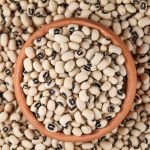
21. Bottle Gourd (Lauki):
Consuming bottle gourd is believed to hydrate the body and increase milk supply. It can be made into a curry, juice, or even a dessert.
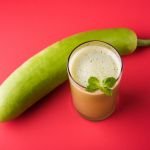
22. Coconut & Coconut Milk:
Coconut is believed to be beneficial for nursing mothers. Coconut milk can be added to curries, sweets, or consumed directly.
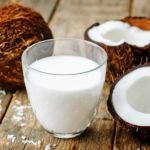
23. Amla (Indian Gooseberry):
A powerhouse of Vitamin C, amla is believed to not only boost immunity but also enhance milk production. It can be consumed as juice, pickles, or in powdered form.

24. Jaggery (Gur):
Rich in iron, jaggery is often recommended to replenish the iron stores of nursing mothers. It’s also believed to purify the blood and enhance milk production. It can replace sugar in many dishes.
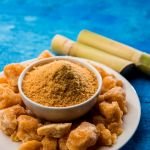
b. Stay Hydrated:
The importance of hydration cannot be overstated. Your body needs ample fluids to produce milk. Aim to drink at least 8-10 glasses of water daily. If you find water bland, infuse it with fruits or opt for herbal teas.
c. Balanced Diet:
Remember, the quality of your milk is influenced by what you eat. A diet rich in whole grains, protein, fruits, and vegetables can be beneficial.
2. Hydration’s Role in Milk Production:
Milk is about 88% water. So, it’s intuitive that staying hydrated is crucial for milk production. Dehydration can reduce your milk supply and make nursing more challenging. Keep a water bottle handy, especially when nursing. Your thirst will often increase during feeds – nature’s way of reminding you to hydrate!
3. Recognizing Signs of Low Milk Production:
It’s essential to know when your supply might be dwindling. Some signs include:
- Baby’s Behavior: If your baby seems unsatisfied after feeds, frequently wants to nurse, or is not gaining weight appropriately, it might indicate a supply issue.
- Reduced Breast Fullness: While it’s normal for breasts to feel less full as your body adjusts to your baby’s needs, a sudden or notable decrease in fullness might indicate a drop in supply.
- Decreased Wet Diapers: Babies who are well-fed produce 6 or more wet diapers a day after the first week of life.
- Noticeable Drop in Pumped Milk: If you pump regularly, a sudden decrease in the amount you can pump is a sign to watch.
However, remember that the best indicator of adequate milk supply is a content and growing baby. If you’re concerned, always consult with a lactation consultant or pediatrician.
Incorporating in Daily Diet:
Indian cuisine offers a variety of dishes where these ingredients can be seamlessly incorporated. From ‘dal’ (lentil soup) to ‘parathas’ (stuffed flatbreads), ‘pulao’ (spiced rice), and ‘kheer’ (rice pudding), there are countless ways to enjoy these milk-boosting foods.
Remember, while these foods have been traditionally believed to aid in lactation, every individual’s body might react differently. It’s crucial to focus on a balanced diet, stay hydrated, and consult with healthcare professionals or lactation experts when in doubt.

In Conclusion:
The journey of breastfeeding is unique for every mother. While the tips above can help, it’s crucial to remember that every body is different. What works for one may not work for another. Stay informed, trust your body, and seek support when needed. Your commitment to providing the best for your baby is commendable, and you’re doing an incredible job!



 Stuttering in Toddlers and Preschoolers
Stuttering in Toddlers and Preschoolers  Foods that May Boost Breastmilk Supply
Foods that May Boost Breastmilk Supply  How to Take Care of Kids in Pet-Friendly Homes
How to Take Care of Kids in Pet-Friendly Homes  How much screen time is appropriate for kids?
How much screen time is appropriate for kids? 




Recent Comments